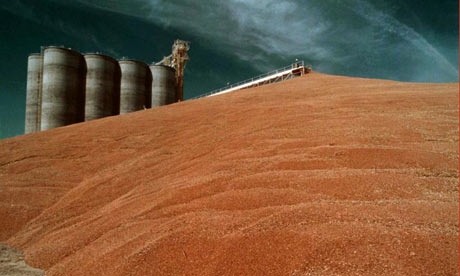



"The 2009 figures from the US Department of Agriculture shows ethanol production rising to record levels driven by farm subsidies and laws which require vehicles to use increasing amounts of biofuels.
"The grain grown to produce fuel in the US [in 2009] was enough to feed 330 million people for one year at average world consumption levels," said Lester Brown, the director of the Earth Policy Institute, a Washington thinktank ithat conducted the analysis.
Last year 107m tonnes of grain, mostly corn, was grown by US farmers to be blended with petrol. This was nearly twice as much as in 2007, when Bush challenged farmers to increase production by 500% by 2017 to save cut oil imports and reduce carbon emissions.
More than 80 new ethanol plants have been built since then, with more expected by 2015, by which time the US will need to produce a further 5bn gallons of ethanol if it is to meet its renewable fuel standard."
In yet another article, scientists express concerns about the impact of nitrous oxides necessary to fertilize biofuel growth.
"Scientists at the European commission have cast doubt on whether biofuels could ever be produced sustainably in significant quantities, dealing a blow to the aviation industry, which sees such fuel as a key way to reduce its emissions.
The researchers argue that the greenhouse gases emitted in making biofuel may well negate most of the carbon dioxide savings made by replacing fossil fuels. Of particular concern is the uncertainty over emissions of the potent greenhouse gas nitrous oxide.
Heinz Ossenbrink, of the EC's Institute of Energy (IoE), said research carried out by EU-funded scientists increasingly pointed to a long-term problem for large-scale biofuels use, namely the emissions of nitrous oxide. This is about 270 times more potent than carbon dioxide as a greenhouse gas and is released through use of fertilisers to grow biofuel crops. "Some of the older studies don't take that into account," he said. "We have now come to less positive values for biofuels."
No comments:
Post a Comment